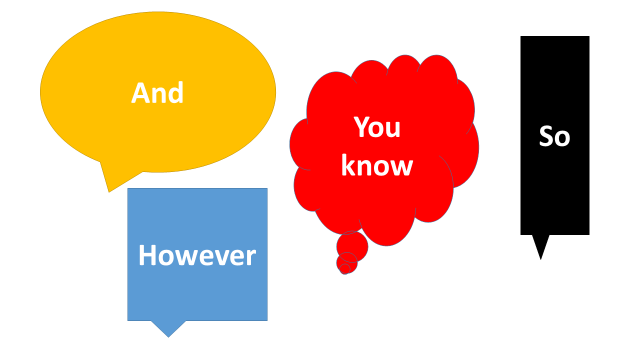How to double your impact when presenting… halve your words and mind your voice!

Just recently I had a severe cold and sore throat. It really hurt to talk – so I basically stopped talking for almost 2 days.
Torture for me. A treat for my husband!
After 2 days, my throat was still painful so I was making a real effort to speak less.
This involved a lot of thumbs up, thumbs down, nodding, head shaking, and making of sad faces … a lot of sad faces 🙁 ! I was out to squeeze as much sympathy as I could out of these few days in the bed.
Thankfully, my issue with my voice recently was a temporary thing. When I was back in the office, I did mention to any clients I was phoning, that I was just over a throat issue, so was minding my voice. This got me a bit more sympathy 🙂 but also helped them understand why my phone calls were briefer than normal.
However, what if you have ongoing struggles with your voice? Maybe you have to speak for an extraordinary number of hours every week? Maybe you have a voice condition? Below are some tips which can help you use your voice less, yet still have an impact.
1. Do great preparation
Great preparation is not only the key to delivering a great presentation, but it really is key to ensuring that you use less words.
Watch the speaker who is unprepared. Watch out for the number of times they use crutch words or phrases such as, em, eh, you know, or the one that many of our Gaelic footballers use – I suppose.
They will often use the phrase “as I said already …”.
Well, if you said it already – why are you saying it again?!
I have no issue with someone repeating phrases or points, consciously, for impact. However, I seriously struggle with the ill-prepared speaker repeating themselves. What a waste of energy, use of their voice and time (mine and theirs!).
2. Put your words under the magnifying glass – class!
Patricia Fripp is hailed as “one of the most electrifying speakers in Northern America”. She is also a fantastic sales presentation trainer. I had the pleasure of attending a coaching day she did in Ireland a few years ago, she was brilliant! She has a wonderful tip for getting rid of extra words. She calls it, “putting your words under the magnifying glass”.
Fripp suggests that you record one of your real live presentations, as delivered, unedited.
I suggest you could do this with a dry run of a presentation. You can do it by recording yourself on your mobile phone. Then you transcribe the whole presentation, word for word.
You look at it, one sentence at a time.
Then you highlight any of the repetitive phrases and words. Get the idea? You can fairly rapidly see where you are using words that are totally unnecessary. You might also identify chunks that could have been cut completely.
This is part and parcel of your great preparation
3. Less conjunctions and more punctuation

Have you ever noticed that instead of finishing a sentence a speaker will often tag on a conjunction? A conjunction is a word that links clauses or sentences. There are lots of different types. In my opinion, the ones that are most often used (instead of full stops and other punctuation marks) are: and, however, but and the oh so favourite one of so many people so!
When someone uses a lot of these conjunctions their sentences become very long and they tend to go on and on so their sentences become very long and wieldy and a bit all over the place however the speaker often does not even realise this and they waffle and use way too many words which ends up confusing their audience and sometimes they even confuse themselves
Try that same paragraph, with a few commas and a lot of full stops:
When someone uses a lot of these conjunctions, their sentences become very long. They tend to go on and on. Their sentences become very long, wieldy and a bit all over the place. The speaker often does not even realise this. They waffle, and use way too many words, which ends up confusing their audience. Sometimes, they even confuse themselves!
See the difference? Get rid of the conjunctions and use more punctuation. You will notice that the more you pause between sentences, the more time you have to think of your next sentence. This invariably leads to more succinct communication.
4. Pause for them and for you
While on the topic of pausing … make sure your full stop pauses last for 3 seconds. Too many people take micro pauses when speaking, which does not allow for a deep enough breath.
When we take a good breath, we fill the diaphragm with air which allows us to put more power into our voice.
If we haven’t taken in enough air, we can end up trying to project our voice from our throat which puts the vocal folds under severe pressure. Disastrous, if there is already an issue with the voice.
Also, for us females, if we are projecting from our throats our voices can become quite high pitched. This does not augur well for creating an impression of gravitas and confident presence.
Practice diaphragmatic breathing. If you spend even 1 minute, morning and night, in bed practising, you will be amazed at how quickly you become adept at breathing more deeply and effectively.
5. Put more detail on your slides
This is the only time you will ever hear me give this recommendation!
I am usually hell bent on getting people to take content off the slides, on the vein of “Less is More and More is Less”! However, if you have a voice condition, putting a little more detail into your slides can help you say less. For some slides, you might click – show the slide and say, “need I say more?”
With others, you might get away with just a few words. For example, if you pop up a diagram or a good chart, you might say “Take a moment to digest the detail. I don’t think I need to add more, other than to highlight (Key Point)”. Keep the key point clear and succinct.
Bear in mind, it is most likely that most of us are presenting to adults. Therefore, we generally do not need to over-elaborate. If your slides are clear and you make a simple point or two, the chances are that they will ‘get it’.
Be conscious as you transition between slides that you eliminate unnecessary words.
For example, often we hear people saying things like “moving along to this next slide, you will see the projections for the next quarter … ”.
Instead, you could say “next quarter projections …” You have now said in 3 words, what you previously said in 15! Imagine if, for your whole presentation, you could cut the word count by one-fifth – what would the effect be on your voice? On your impact?
So, why wait until you have a voice issue to cut your word count?
Start today.
Halve your words, double your impact and mind your voice.
If you or your team struggle with presenting with impact, you may be interested in our in-company presentation skills masterclasses.

